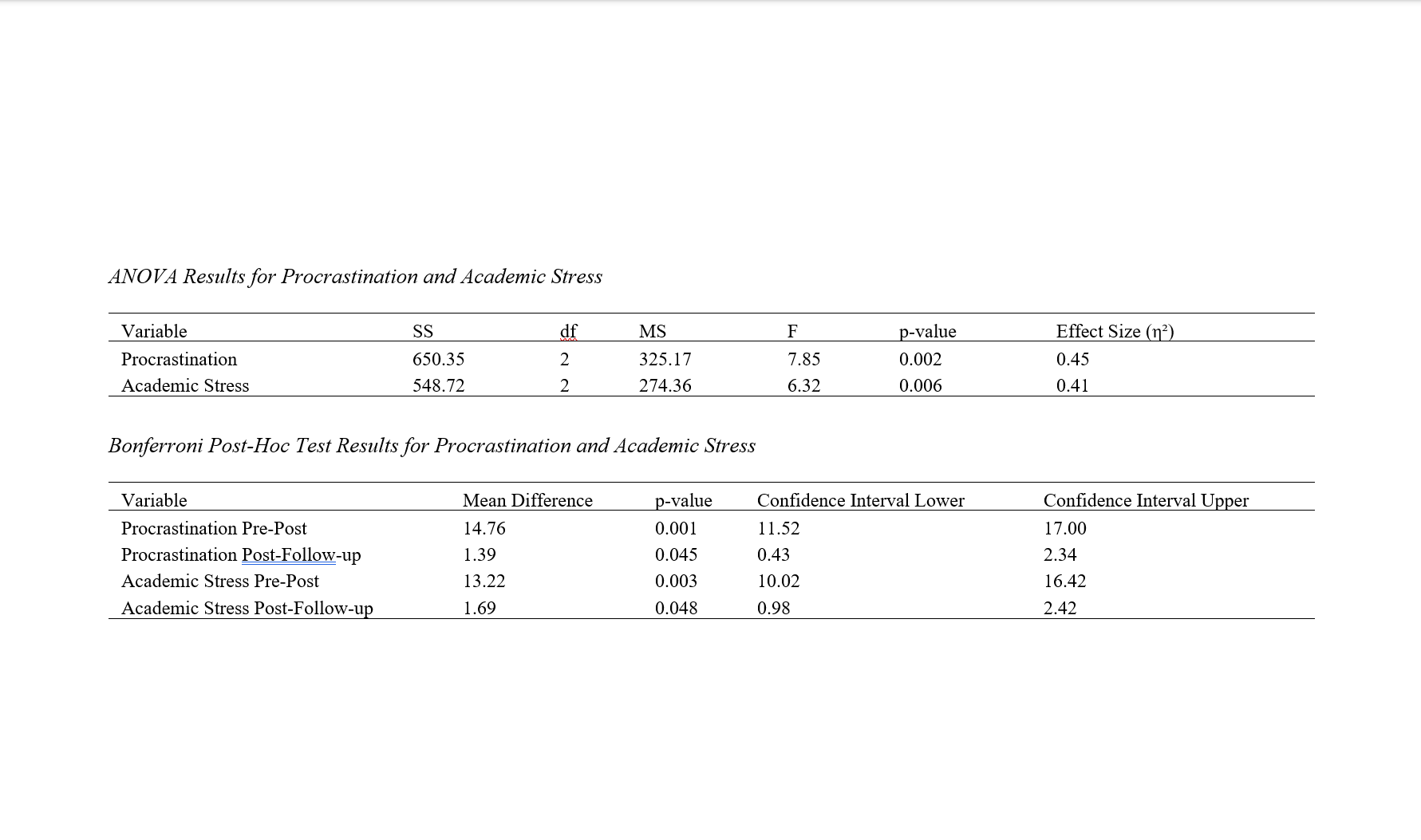Effectiveness of Online Cognitive Behavioral Intervention on Procrastination and Academic Stress
Keywords:
Online CBT, procrastination, academic stress, university students, randomized controlled trial, interventionAbstract
Objective: This study aimed to evaluate the effectiveness of an online cognitive-behavioral therapy (CBT) intervention in reducing procrastination and academic stress among university students.
Methods and Materials: A randomized controlled trial (RCT) was conducted with 30 university students from Bangladesh, who were randomly assigned to either the intervention (online CBT) group (n = 15) or the control group (n = 15). The intervention consisted of eleven weekly online CBT sessions, each lasting 45 to 60 minutes. Procrastination and academic stress were measured using the Procrastination Assessment Scale for Students (PASS) and the Academic Stress Scale (ASS) at three stages: pre-intervention, post-intervention, and four-month follow-up. Data were analyzed using repeated measures analysis of variance (ANOVA), with Bonferroni post-hoc tests to assess changes within and between groups.
Findings: The results indicated that the intervention group showed significant reductions in both procrastination (F = 7.85, p = 0.002) and academic stress (F = 6.32, p = 0.006) across the three stages. The intervention group’s procrastination scores decreased from pre-intervention (M = 63.27) to post-intervention (M = 48.51) and were maintained at follow-up (M = 47.12). Similarly, academic stress scores dropped from pre-intervention (M = 55.36) to post-intervention (M = 42.14) and remained lower at follow-up (M = 41.05). The control group showed no significant changes. Bonferroni post-hoc tests confirmed these findings, with significant mean differences in procrastination and stress at various stages.
Conclusion: The online CBT intervention was effective in significantly reducing procrastination and academic stress among university students, with these improvements maintained over a four-month follow-up period. This supports the utility of online CBT as a feasible and effective tool for addressing procrastination and stress in academic settings.
Downloads
References
Afshari, M., Khayatan, F., & Yousefi, Z. (2022). A Comparison of the Effectiveness of the Reality-Based Acceptance and Commitment Therapy (RACT) Package and Cognitive-Behavioral Therapy (CBT) in Improving Procrastination and Responsibility in Adolescent Girls. Aftj, 3(2), 1-19. https://doi.org/10.61838/kman.aftj.3.2.1
Afshari, M., Khayatan, F., & Yousefi, Z. (2022). Development of a Package of Reality-Oriented Acceptance and Commitment Therapy (RACT) and Comparing Its Effectiveness With Cognitive Behavioral Therapy (CBT) on Procrastination, Self-Efficacy and Academic Competence of Students With Academic Burnout. Jayps, 3(3), 220-239. https://doi.org/10.61838/kman.jayps.3.3.18
Albulescu, I., Labăr, A.-V., Manea, A.-D., & Stan, C. (2024). The Mediating Role of Cognitive Test Anxiety on the Relationship Between Academic Procrastination and Subjective Wellbeing and Academic Performance. Frontiers in Public Health, 12. https://doi.org/10.3389/fpubh.2024.1336002
Arafa, S. (2024). Overcoming Academic Procrastination: The Effectiveness of Psychological Resilience in Primary School Pupils Post COVID-19. International Journal of Education and Practice, 12(3), 996-1011. https://doi.org/10.18488/61.v12i3.3818
Bistricky, S. L., Lopez, A. K., Pollard, T., Egan, A., Gimenez-Zapiola, M., Pascuzzi, B., Velasquez, K. M., & Graves, M. (2023). Brief Multimodal Intervention to Address Bedtime Procrastination and Sleep Through Self-Compassion and Sleep Hygiene During Stressful Times. https://doi.org/10.1101/2023.04.16.23288655
Carlson, S. E., Suchy, Y., Baron, K. G., Johnson, K. T., & Williams, P. (2023). A Daily Examination of Executive Functioning and Chronotype in Bedtime Procrastination. Sleep, 46(8). https://doi.org/10.1093/sleep/zsad145
Cherrier, S., Wattelez, G., Ferrière, S., & Borst, G. (2023). NeuroStratE: An Educational Neuroscience Intervention to Reduce Procrastination Behavior and Improve Executive Planning Function in Higher Students. Frontiers in Education, 8. https://doi.org/10.3389/feduc.2023.1149817
Cho, G. S. (2023). The Relationships Between Academic Stress and Academic Procrastination of Medical School Students: Mediating Effect of Approval Motivation. Korean Association for Learner-Centered Curriculum and Instruction, 23(15), 129-138. https://doi.org/10.22251/jlcci.2023.23.15.129
Jang, H. I., & Park, J. H. (2023). The Effect of Self-Regulated Learning Behavior on Online Academic Procrastination and the Moderating Role of Parental Academic Involvement Latent Profiles Among Middle School Students. Korean Journal of Child Studies, 44(3), 225-238. https://doi.org/10.5723/kjcs.2023.44.3.225
Kadosh, M., Hen, M., & Ferrari, J. R. (2023). Reducing Statistics Anxiety and Academic Procrastination Among Israeli Students: A Pilot Program. Teaching Statistics, 45(3), 167-175. https://doi.org/10.1111/test.12356
Kohli, M., Gupta, N., Saini, P., & Kohli, G. S. (2022). Comparison of Acceptance and Commitment Therapy (ACT) and Cognitive Behavioural Therapy (CBT) for Treatment of Academic Procrastination. Ecs Transactions, 107(1), 3321-3327. https://doi.org/10.1149/10701.3321ecst
Lee, J. K. (2023). Overcoming Academic Procrastination: A Behavioral-Cognitive Approach. https://doi.org/10.31234/osf.io/qj3bd
Li, H., Luo, W., Xi, J., & Peng, Y. (2022). Development and Validation of the Multidimensional Procrastination Scale in Chinese. European Journal of Psychological Assessment, 38(5), 412-426. https://doi.org/10.1027/1015-5759/a000675
Ma, H., Ma, Q., Ma, Z., & Song, M. (2024). Exploring the Complex Interplay of Procrastination Between Biological, Cognitive, Developmental, Social, and Psychological Factors. Journal of Education Humanities and Social Sciences, 26, 1054-1057. https://doi.org/10.54097/0cwzjj22
Paula, Y. A. d., Padovani, R. d. C., & Sylvia Helena Souza da Silva, B. (2022). University Students' Opinions About Academic Rocrastination: Knowing and Intervening. Educação Em Revista, 38. https://doi.org/10.1590/0102-469826629t
Putri, R. D., Ramadhani, E., Laras, P. B., & Suhardita, K. (2023). Konseling Cognitive Behavior Therapy Dalam Mereduksi Prokrastinasi Menyelesaikan Skripsi. Jurnal Wahana Konseling, 6(1), 55-64. https://doi.org/10.31851/juang.v6i1.12168
Salsabilla, Z. A., Bayhakki, B., & Woferst, R. (2022). Hubungan Persepsi Pembelajaran Daring Terhadap Tingkat Prokrastinasi Mahasiswa. Coping Community of Publishing in Nursing, 10(4), 463. https://doi.org/10.24843/coping.2022.v10.i04.p15
Schuenemann, L., Scherenberg, V., Salisch, M. v., & Eckert, M. (2022). “I’ll Worry About It Tomorrow” – Fostering Emotion Regulation Skills to Overcome Procrastination. Frontiers in psychology, 13. https://doi.org/10.3389/fpsyg.2022.780675
Tamura, Y., & Morino, K. (2024). Relationship Analysis Between Procrastination Behavior and Non-Cognitive Abilities. Icce. https://doi.org/10.58459/icce.2024.5066
Tolan, Ö. Ç. (2023). Developing University Students Coping Skills With Academic Procrastination Behavior: A Cognitive Behavioral Theory Based Psychoeducation Practice. Journal of Computer and Education Research, 11(22), 728-743. https://doi.org/10.18009/jcer.1332329
Ying, Z., & Wang, J. (2023). Internet-Based Self-Help Intervention for Procrastination: Randomized Control Group Trial Protocol. Trials, 24(1). https://doi.org/10.1186/s13063-023-07112-7

Downloads
Additional Files
Published
Submitted
Revised
Accepted
Issue
Section
License

This work is licensed under a Creative Commons Attribution-NonCommercial 4.0 International License.














